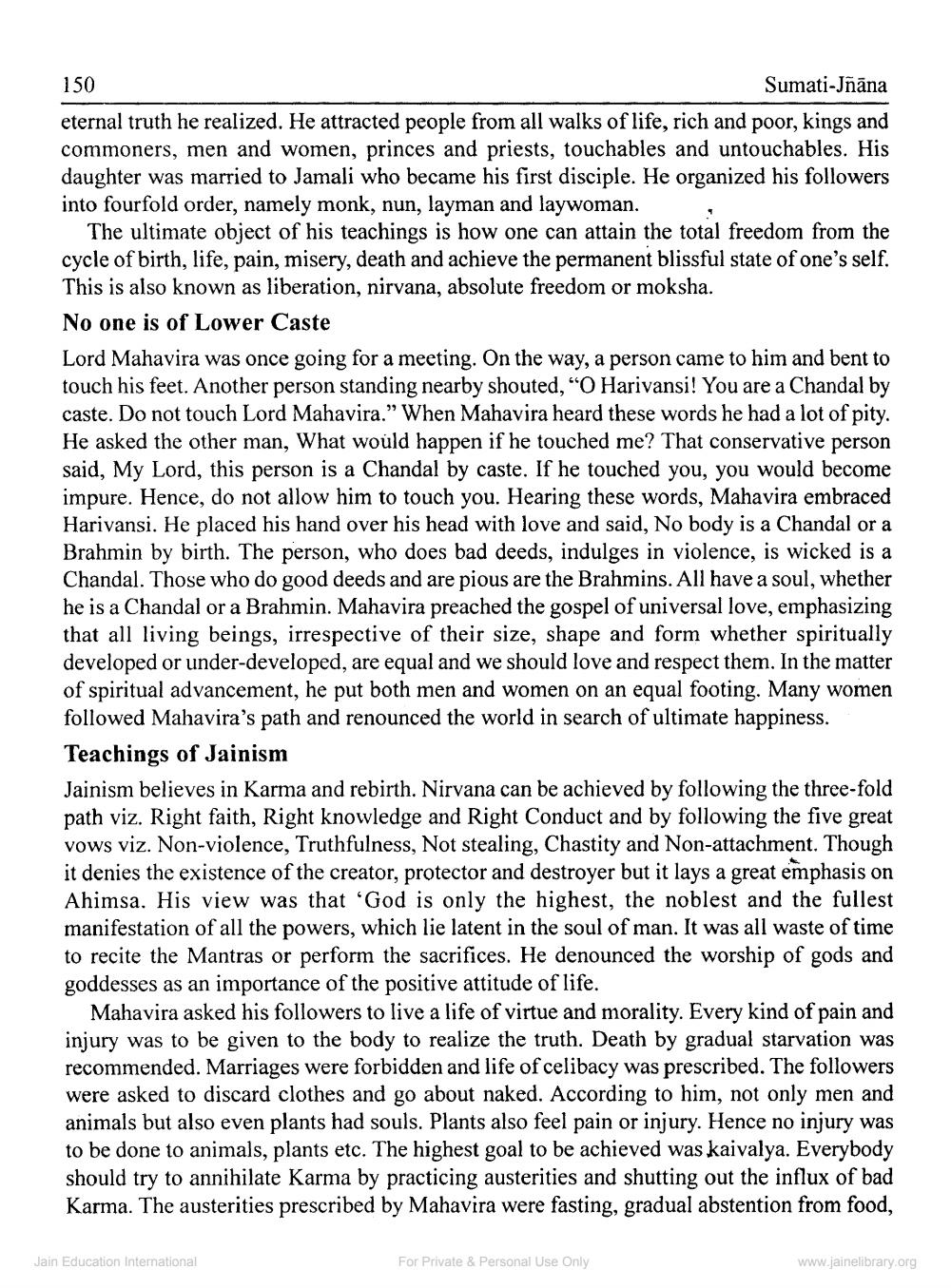________________
150
Sumati-Jñana eternal truth he realized. He attracted people from all walks of life, rich and poor, kings and commoners, men and women, princes and priests, touchables and untouchables. His daughter was married to Jamali who became his first disciple. He organized his followers into fourfold order, namely monk, nun, layman and laywoman.
The ultimate object of his teachings is how one can attain the total freedom from the cycle of birth, life, pain, misery, death and achieve the permanent blissful state of one's self. This is also known as liberation, nirvana, absolute freedom or moksha. No one is of Lower Caste Lord Mahavira was once going for a meeting. On the way, a person came to him and bent to touch his feet. Another person standing nearby shouted, “O Harivansi! You are a Chandal by caste. Do not touch Lord Mahavira." When Mahavira heard these words he had a lot of pity. He asked the other man, What would happen if he touched me? That conservative person said, My Lord, this person is a Chandal by caste. If he touched you, you would become impure. Hence, do not allow him to touch you. Hearing these words, Mahavira embraced Harivansi. He placed his hand over his head with love and said, No body is a Chandal or a Brahmin by birth. The person, who does bad deeds, indulges in violence, is wicked is a Chandal. Those who do good deeds and are pious are the Brahmins. All have a soul, whether he is a Chandal or a Brahmin. Mahavira preached the gospel of universal love, emphasizing that all living beings, irrespective of their size, shape and form whether spiritually developed or under-developed, are equal and we should love and respect them. In the matter of spiritual advancement, he put both men and women on an equal footing. Many women followed Mahavira's path and renounced the world in search of ultimate happiness. Teachings of Jainism Jainism believes in Karma and rebirth. Nirvana can be achieved by following the three-fold path viz. Right faith, Right knowledge and Right Conduct and by following the five great vows viz. Non-violence, Truthfulness, Not stealing, Chastity and Non-attachment. Though it denies the existence of the creator, protector and destroyer but it lays a great emphasis on Ahimsa. His view was that 'God is only the highest, the noblest and the fullest manifestation of all the powers, which lie latent in the soul of man. It was all waste of time to recite the Mantras or perform the sacrifices. He denounced the worship of gods and goddesses as an importance of the positive attitude of life.
Mahavira asked his followers to live a life of virtue and morality. Every kind of pain and injury was to be given to the body to realize the truth. Death by gradual starvation was recommended. Marriages were forbidden and life of celibacy was prescribed. The followers were asked to discard clothes and go about naked. According to him, not only men and animals but also even plants had souls. Plants also feel pain or injury. Hence no injury was to be done to animals, plants etc. The highest goal to be achieved was kaivalya. Everybody should try to annihilate Karma by practicing austerities and shutting out the influx of bad Karma. The austerities prescribed by Mahavira were fasting, gradual abstention from food,
Jain Education International
For Private & Personal Use Only
www.jainelibrary.org




